

Yes, the Octopus Is Smart as Heck. But Why? To demonstrate how smart an octopus can be, Piero Amodio points to a YouTube video.
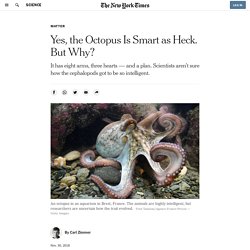
It shows an octopus pulling two halves of a coconut shell together to hide inside. Later the animal stacks the shells together like nesting bowls — and carts them away. “It suggests the octopus is carrying these tools around because it has some understanding they may be useful in the future,” said Mr. Amodio, a graduate student studying animal intelligence at the University of Cambridge in Britain. But his amazement is mixed with puzzlement. For decades, researchers have studied how certain animals evolved to be intelligent, among them apes, elephants, dolphins and even some birds, such as crows and parrots.
The amazing brains and morphing skin of octopuses and other cephalopods. Untangling the mysteries of the octopus. The Soul of an Octopus: How One of Earth’s Most Alien Creatures Illuminates the Wonders of Consciousness. “Despite centuries of investigation by everyone from natural historians, psychologists, and psychiatrists, to ethicists, neuroscientists, and philosophers, there is still no universal definition of emotion or consciousness,” Laurel Braitman wrote in her terrific exploration of the mental lives of animals. Virginia Woolf defined consciousness as “a wave in the mind,” but even if we’re able to ride the wave, we hardly know the ocean out of which it arises. During my annual visit to NPR’s Science Friday to discuss my choices for the year’s best science books, my co-guest — science writer extraordinaire Deborah Blum — mentioned a fascinating book that had slipped my readerly tentacles, one that addresses this abiding question of consciousness with unparalleled rigor and grace: The Soul of an Octopus: A Surprising Exploration into the Wonder of Consciousness (public library) by naturalist, writer, and documentary filmmaker Sy Montgomery.
Montgomery begins with a seemingly simple premise. Giant Pacific Octopus. Octopus Genome Offers Insights click 2x. Octopuses are the World’s Greatest Escape Artists (Ft. PhilosophyTube) The Most Intelligent Animal on Earth? - Aliens of the Deep Sea. 'Octomoms' on Edge: Fascinating Brooding Octopods. Hardest Working Mom on the Planet-Octopus. Adorable Pink Octopus. Octopus And Squid Evolution Is Officially Weirder Than We Could Have Ever Imagined. A Real Shapeshifter - The Mimic Octopus. Two-spot octopus, Reefs & Pilings, Octopuses & Kin, Octopus bimaculoides at the Monterey Bay Aquarium.
On Exhibit: Tentacles Animal Facts Natural History A two-spot octopus spends most of the time hiding or searching for food on the seafloor.
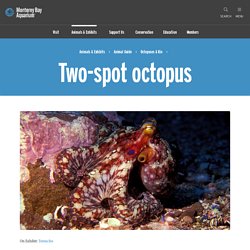
Using its arms and suckers, it can slowly creep or quickly crawl. But if it's in danger, the octopus may jet away into open water. Glowing blue circular eyespots on each side of its head may trick predators and prey alike into thinking that the blue-eyed beauty marks are its actual eyes. Conservation Octopuses are very sensitive to impaired water quality. Cool Facts Females tend their eggs continuously for two to four months until they hatch. Animal Guide Home Search Animal Guide. Where's The Octopus? 10 Most Beautiful Octopus Species In The World. Earth - Eight reasons why octopuses are the geniuses of the ocean. In 2007 I was snorkelling in Dahab, Egypt, when I came face-to-face with a common octopus.
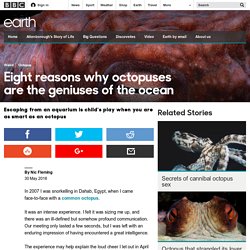
It was an intense experience. I felt it was sizing me up, and there was an ill-defined but somehow profound communication. Our meeting only lasted a few seconds, but I was left with an enduring impression of having encountered a great intelligence. Octopuses Get Strangely Cuddly On The Mood Drug Ecstasy click 2x. Octopuses are smart, playful. The following excerpt is from Sy Montgomery and Elizabeth Marshall Thomas’ book Tamed and Untamed: Close Encounters of the Animal Kind.
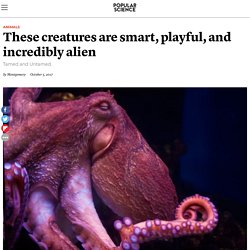
Everyone wanted to pet Octavia. And no wonder. She was beautiful, graceful, and affectionate. The fact that she was boneless, slimy, and living in painfully cold, 47°F water deterred none of us. What thrilled us—me, New England Aquarium volunteer Wilson Menashi, and four visitors from the environmental radio show Living on Earth—was the surprising fact that Octavia, who clearly wanted to be petted, was a giant Pacific octopus. When her keeper, Bill Murphy, opened the top of her exhibit, Octavia had recognized Wilson and me immediately; we’d been working with her for several weeks. Soon the Living on Earth crew joined in. Cephalove: A View of the Octopus Brain. In this post, I am going to outline octopus neuroanatomy, to the best of my ability.
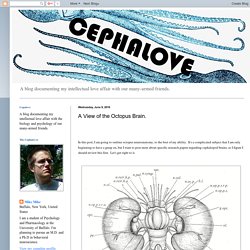
It's a complicated subject that I am only beginning to have a grasp on, but I want to post more about specific research papers regarding cephalopod brains, so I figure I should review this first. Let's get right to it. This figure is from J. The long and lonely vigil of an octopus mother. A dedicated deep-sea octopus mother off the coast of California has spent four and a half years tending to a single clutch of eggs – by far the longest brood time of any known animal, reports marine biologist Bruce Robison in the journal PLOS ONE.
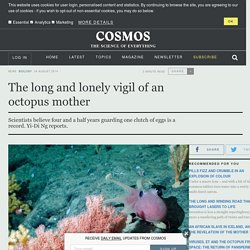
“These deep-sea species have always been at the fringes of our knowledge,” says Mark Norman, cephalopod researcher and head of science at Museum Victoria. “I’m not surprised they brood for a long time but I’m surprised it was this long.” In April 2007, while surveying a site some 1,400 metres underwater, Robison and his team from the Monterey Bay Aquarium Research Institute noticed a pale purple Graneledone boreopacifica octopus moving towards the surface of a rocky outcrop. How the octopus got its smarts. In 2008 the staff at Sea Star Aquarium in Coburg, Germany, had a mystery on their hands.
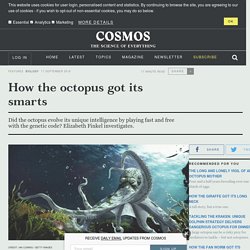
Two mornings in a row, they had arrived at work to find the aquarium eerily silent: the entire electrical system had shorted out. Each time they would reset the system only to find the same eerie silence greeting them the next morning. So on the third night a couple of staff members kept vigil, taking turns to sleep on the floor. It’s World Octopus Day! Here Are Eight Awesome Octopodes. Hooray—it’s world octopus day.
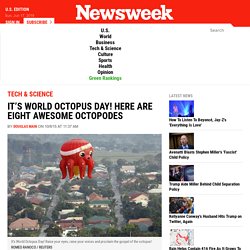
Today we celebrate the excellent eight-legged creatures that grace our oceans, and occasionally even venture out of the water. (Even Aristotle knew: “the only cephalopod to go out on to dry land is the octopus.”) What other animal has three hearts, a brain-like set of nerves in each leg and blue blood? What other 50-pound beast could fit through a two-inch hole? None, I tell you. Beautiful Octopus Pictures: Masters of Disguise and Agile Hunters. Octopus Photos, Pictures & Images. Types of Octopuses - Octopus Facts and Information. Octopus Species Index Octopus Species There are seven species of bears that remain on the Earth today.
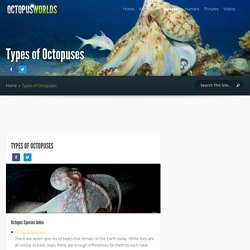
While they are all similar in basic ways, there are enough differences for them to each have their own category as well as name.Atlantic Pygmy Octopus The Atlantic Pygmy Octopus is very small, only about 5 ½ inches in length overall. The Mind of an Octopus. Adapted from Other Minds: The Octopus, the Sea and the Deep Origins of Consciousness, by Peter Godfrey-Smith.
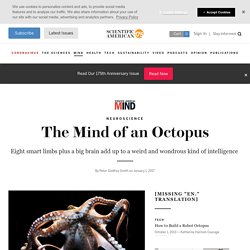
Copyright © 2016 by Peter Godfrey-Smith. Published by arrangement with Farrar, Straus and Giroux, LLC (U.S.), HarperCollins (U.K.) Someone is watching you, intently, but you can't see them. Then you notice, drawn somehow by their eyes. You're amid a sponge garden, the seafloor scattered with shrublike clumps of bright orange sponge. A second meeting with an octopus: this one is in a den. Octopuses and their relatives (cuttlefish and squid) represent an island of mental complexity in the sea of invertebrate animals. Comparing Brains. Alien intelligence: the extraordinary minds of octopuses and other cephalopods. Inches above the seafloor of Sydney’s Cabbage Tree Bay, with the proximity made possible by several millimetres of neoprene and a scuba diving tank, I’m just about eyeball to eyeball with this creature: an Australian giant cuttlefish.
Even allowing for the magnifying effects of the mask snug across my nose, it must be about 60cm (two feet) long, and the peculiarities that abound in the cephalopod family, that includes octopuses and squid, are the more striking writ so large. Its body – shaped around an internal surfboard-like shell, tailing off into a fistful of tentacles – has the shifting colour of velvet in light, and its W-shaped pupils lend it a stern expression. I don’t think I’m imagining some recognition on its part. Click on pictue scroll down for videos. This flapjack octopus is so cute that it might officially be named “adorabilis.” Specimens of this unnamed octopus have been collected since 1990; now Stephanie Bush, a postdoctoral researcher at the Monterey Bay Aquarium Research Institute in California, said that she is considering the scientific name Opisthoteuthis Adorabilis.
Opisthoteuthis is the same genus as Pearl, the pink flapjack octopus in “Finding Nemo.” The octopus is 7 inches (17.8cm) in diameter, lives in the deep sea, and has a web between its legs, allowing it to “parachute” through the water. It uses the fins on its mantle to steer. More info: montereybayaquarium.org | Facebook | Instagram | Tumblr | YouTube (h/t: huffpost) Octopus Changes Colors and Disappears into Seafloor. Coconut Octopus (just an amazing picture)
This is How Super Smart Octopuses Are. The cephalopod’s genome reveals how the creatures evolved intelligence to rival the brightest vertebrates. We humans think we’re so fancy with our opposable thumbs and capacity for complex thought. But imagine life as an octopus … camera-like eyes, camouflage tricks worthy of Harry Potter, and not two but eight arms – that happen to be decked out with suckers that possess the sense of taste. And not only that, but those arms? They can execute cognitive tasks even when dismembered. Greg Gage: How octopuses battle each other.